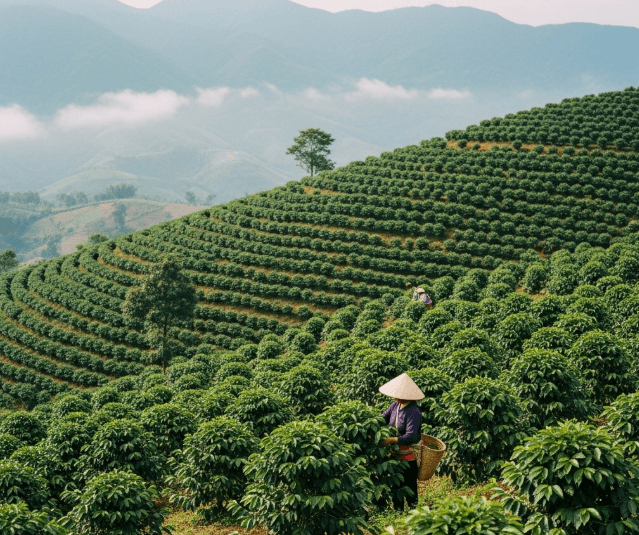Son La, Vietnam — July 18, 2025 — The Department of Agriculture and Environment of Son La Province convened a strategic consultation meeting to shape the future of the local coffee industry for the 2025–2030 period, with a long-term vision to 2035. The meeting aimed to assess current developments, identify key challenges, and establish a roadmap for the sustainable growth of one of the province’s most important agricultural sectors.
A National Leader in Arabica Coffee
Son La is currently Vietnam’s largest producer of Arabica coffee, accounting for 50% of the national cultivation area and 43.5% of total output. As of mid-2025, the province cultivates approximately 24,300 hectares of coffee, yielding 37,724 tons of green beans—a 36% increase in area and 41% rise in production compared to 2021. Each hectare of coffee generates between VND 170 to 200 million (approx. USD 6,700 to 7,800) in revenue, with profits exceeding VND 140 million (USD 5,500).
This strong foundation provides a significant advantage for Son La to develop high-quality specialty coffee aligned with global trends in sustainable and eco-conscious consumption.
Specialty Coffee Gains Ground
To capitalize on this potential, Son La has rolled out a range of initiatives. These include certifying and managing 5,000 mother trees and three coffee nurseries, expanding 1,120 hectares of specialty coffee farms, and certifying over 23,000 hectares under RA, 4C, VietGAP, and organic standards. The province also maintains seven organizations licensed to use the “Son La Coffee” geographical indication and has developed two high-tech farming zones involving over 1,000 hectares and 1,560 farming households.
In the first half of 2025, Son La exported 17,800 tons of coffee, generating nearly USD 70 million—a 30% increase year-on-year.
Key Challenges Remain
Despite this progress, industry leaders at the meeting acknowledged ongoing challenges. Mr. Phung Kim Son, Director of the Department of Agriculture and Environment, highlighted weaknesses in seed quality, outdated cultivation practices, fragmented value chains, limited investment in processing, and underdeveloped export markets.
“How can we turn these challenges into opportunities? We must find breakthrough solutions to craft a unique identity and compelling story for Son La’s coffee brand,” he stated.
Mr. Vuong Van Hai, Chairman of the Son La Coffee Association, outlined five major issues: the aging Catimor variety planted over 30 years ago; limited adoption of modern cultivation techniques; lax seed quality control; small-scale, environmentally harmful processing operations; and a heavy reliance on green bean exports, which make up 85–90% of the province’s total coffee output.
Currently, Son La has 28 coffee enterprises and cooperatives, but only five possess industrial-scale processing capabilities. While value chain linkages are emerging, they remain small in scale and lack broader impact. Meanwhile, plans to establish centralized coffee processing clusters face obstacles such as funding, land access, and policy support.
Replanting and Innovation as Strategic Priorities
Participants from nine local enterprises and cooperatives proposed a variety of forward-looking strategies, including accelerating coffee replanting across 9,800 hectares, expanding training and technical support, promoting branding and marketing, and registering domestic and international trademarks to build global recognition for Son La coffee.
Particular emphasis was placed on the importance of adopting high technology, developing clean and circular farming models, and securing international certifications to enhance product value and increase farmer incomes.
Building a Long-Term Vision
Concluding the meeting, Mr. Phung Kim Son reaffirmed Son La’s commitment to positioning coffee as a key crop for rural prosperity. The recent consolidation of agricultural and environmental agencies, along with the implementation of Resolution 57 on scientific and digital transformation, gives the province a strategic advantage in agricultural development.
Son La has also streamlined its extension services by integrating 12 district agricultural centers into a single Agricultural Technical Center under the Department of Agriculture and Environment. This consolidation enhances the province’s ability to deliver technical support, respond to local needs, and implement policy initiatives effectively.
Moving forward, the Department will host biannual review meetings to monitor progress and adjust strategies as needed. In the near term, it will work with the Son La Coffee Association to define standards for deep processing and specialty coffee, develop targeted programs, and establish a unique identity for Son La’s coffee products. These steps are part of a broader commitment to ensuring the sustainable development and global competitiveness of Son La coffee.

